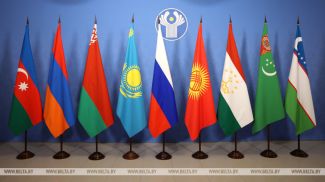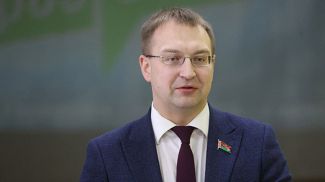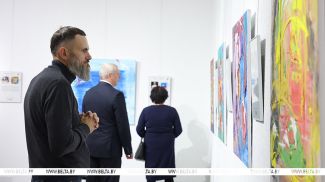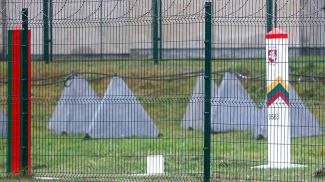MINSK, 1 July (BelTA) – The Forum of Regions has become a landmark event in the life of Belarus and Russia, Chairwoman of the Council of the Republic Natalya Kochanova said at the plenary session of the 8th Forum of Regions of Belarus and Russia on 1 July, BelTA has learned.
"The forum has become one of the landmark events in the life of the two countries and traditionally arouses genuine interest. It contributes both to good human relations and interstate dialogue. The unique project once proposed by Valentina Matviyenko have become an effective platform for large-scale interregional cooperation. Our meetings in Belarus and Russia have always been held in a atmosphere of cordiality, trust and, importantly, have always been results-yielding. Evidence of this is multimillion-dollar contracts, joint production facilities, joint projects," Natalya Kochanova said.
According to her, about 50 cooperation agreements - intergovernmental, interregional, interdepartmental – have been concluded at the forum. An agreement to set up a Belarusian-Russian business council was inked at the meeting of the Business Cooperation Council of the Chambers of Commerce and Industry of our countries. I am sure that it will contribute to direct business contacts, mutual trade and investment,” the speaker said. “It is important that young people take part in the forum's events. The governing bodies of the Chamber of Young Legislators at the Federation Council and the Youth Council of the National Assembly concluded a partnership agreement at their first joint meeting. It will serve as the basis for their effective diverse interaction. We expect that youth cooperation will become a significant factor in the development of Belarusian-Russian integration."
Natalya Kochanova stressed that the agenda of each forum is shaped by the most pressing issues of bilateral relations. "The current one highlights the importance of developing the scientific and technological space of the Union State. Science and innovation are among the key factors for national security. By pooling our capabilities, we will strengthen the sovereignty and independence of our countries,” the speaker noted. “We are proud by right that we have maintained a high level of education and preserved the scientific traditions of the Soviet Union. We have also mastered new areas: IT, bio- and nanotechnology, bioinformatics. The needs of the national economy in specialists capable of using advanced technologies are growing rapidly. This is why it is so important to unite the efforts of Belarus and Russia to ensure a faster pace of human resources development," she said.
Today Belarusian universities cooperate with universities and research centers from almost all regions of Russia. Academic contacts are also developing. Belarusian and Russian scientists are setting up joint laboratories and research and production centers. The academies of sciences of the two countries have developed supercomputers and applied software products, unique DNA technologies for medicine and agriculture.
A roadmap to promote fundamental research is currently in the works. Belarusian nuclear scientists maintain close contacts with the National Research Center Kurchatov Institute. The commission for the formation of the Union State common science and technology space and the Russia-Belarus venture capital fund are up and running.
“The Union State programs remain the basis for academic collaborations between Belarus and Russia. About 60 sci-tech programs have been implemented over 20 years. At the same time, their number is now declining. Last year seven programs were implemented, while in 2021 only four. The financing of sci-tech programs has also been cut. In 2020, it accounted for 29% of the Union State budget spending, in 2021 the figure dropped to 13%. We must reverse this trend. After all, these programs represent specific projects in manufacturing and social sphere. They will not only benefit our economies, but also help retain qualified personnel and prevent a brain drain,” the chair of the Council of the Republic is sure.
Several high-technology and science-intensive projects were implemented in the real sector of the economy, including thanks to contribution from regions. “For example, Russian specialists created smart systems to operate the unmanned haul truck made by Belarus' BelAZ. The countries set up a plant to produce carbon black in Mogilev and a facility to make Amkodor machinery in Russia's Petrozavodsk, launched the high-speed train Lastochka between the two capitals. Belarus established mutually beneficial cooperation with the Russian state corporations Roscosmos and Rosatom. The launch of the remote Earth sensing satellite and the commissioning of the Belarusian nuclear power plant are great examples of such cooperation,” Natalya Kochanova said. “We also advance cooperation with the help of our main innovation centers: the Belarusian Hi-Tech Park and the Russian Skolkovo Innovation Center. There are more than 40 resident companies with Russian capital in the Hi-Tech Park. Some 30 Skolkovo resident companies cooperate with partners from Belarus,” she added.
Belarus and Russia also have social projects. For example, historians of the two countries published the first textbook “Russia and Belarus: Essays on common history” to preserve the historical memory and prevent the distortion of the truth about the Victory in the Great Patriotic Was.
“Belarus became the first country to receive the Russian COVID-19 vaccine and its production technology. I would like to thank once again our Russian friends for their help and support,” Natalya Kochanova said.
The Forum of Regions of Belarus and Russia is held under the auspices of the upper chambers of the parliaments of the two countries – the Council of the Republic of the National Assembly of Belarus and the Federation Council of the Federal Assembly of Russia. The 8th edition of the forum kicked off on 29 June and is running through 1 July. Its main events are held online due to the COVID-19 pandemic.
The participants of the forum discuss science and technology cooperation between Belarus and Russia in the digitalization era and the development of the common scientific and technological space in the Union State.
Speaking at the plenary session are heads of government bodies, ministries and departments, representatives of business communities of the two countries, and digitalization experts.
Photos by Maksim Guchek













